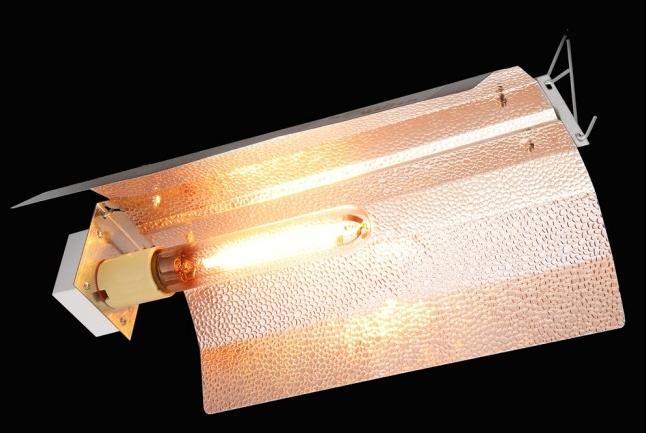High Pressure Sodium Lights

High pressure sodium lights are often considered the single best source of light for blossoming and fruiting crops such as tomatoes, chilis, melons, squash and fruits. They are not the best choice for leafy plant development such as seedlings and/or veggie crops like salad greens.
High Pressure Sodium Lights, or HPS lights, are a mainstay in hydroponic production. They are particularly valuable for flowering, blossom set and fruit production because they offer a slightly different wavelength than metal halide lights, which are used for vegetative growth. However, like metal halide, they are intensely bright. They need high-temperature fixtures to withstand the heat and the higher wattage which most HPS bulbs require. Let's take a closer look at both HPS and metal halide lights, and what roles they each play in horticultural production.
Advantages and Disadvantages
High
pressure sodium lights emit a fairly narrow range of wavelengths. That range
has been chosen to provide the ideal wavelengths needed for blossoming, fruit
set and maturation, rather than vegetative leaf growth. As a result, the only
time you'd want to use HPS lights are when you are growing fruiting plants,
which are either in or about to enter blossom stage or later. Those growers who
are raising vegetative crops such as lettuces will want to use a different
bulb, such as metal halide or fluorescent fixtures. And for those growers who
always have a combination of vegetative and fruiting growth, such as in a
greenhouse growing a wide variety of crops, using metal halide or possibly a
mix of metal halide and HPS lamps would be appropriate. Happily, metal halide
and HPS bulbs can often use the same ballast, as long as the wattage is the
same for each. A grower wishing to start with metal halide and switch over to
high pressure sodium for fruiting crops could do so without buying a new
ballast. Such a switch would provide the plants exactly what they need, without
any duplication of ballast cost.
The only disadvantages of high pressure sodium
lights are that they are so narrowly focused for fruit production. But that is
also their greatest strength. There are plenty of lights available for
generalized production. If you are a grower specializing in fruit production
such as tomatoes, chilis, cucurbita and other greenhouse fruits, high pressure
sodium can play a valuable role in helping your plants reach their full
potential.
Our Experience With High Pressure Sodium Lights
We
have a small number of 400W ballasts which we use for metal halide at the start
of the growing season, and HPS during blossoming, fruit set and maturation as
described above. We have generally been happy with this arrangement, and plan
to continue that arrangement in the future. Our growing so far has been fairly
limited due to lack of greenhouse space and the practice of growing such crops
only seasonally. At some point we wish to expand our operation and experiment
with year-round growing for a mix of vegetative and fruiting crops. At that
stage, we will run some performance evaluations between various lighting
setups. Specifically, we want to compare plant yield between the metal
halide/HPS arrangement we use now, and a straight MH setup, alongside a
straight fluorescent setup. If we run those comparisons, we'll post those
results here.
Where To Find High Pressure Sodium Lights
High Pressure Sodium lights, like metal halide lights, are one of the more common types of lighting fixtures in use today within both conventional and hydroponic/aquaponic grower communities. Unfortunately, hydroponics and aquaponics operations are still rare enough that most lighting retailers won't offer these fixtures except as custom orders, if at all. On the other hand, hydroponics equipment dealers and greenhouse equipment dealers will either be able to order this item for you, or already have these fixtures in stock.
Most metropolitan areas will have at least one or two hydroponics suppliers. Sometimes you have to go looking for these retailers because they only advertise through professional channels such as commercial grower magazines. Or, you may Google the term "HID lighting" plus your location to see a list of related businesses in your area.
HPS lights and ballasts are also commonly shipped from national suppliers to wherever they are needed. High pressure sodium bulbs are relatively lightweight, and shipping for the bulbs themselves will be inexpensive. However, the ballasts will weight quite a bit more and shipping costs may be an issue. If you have the option to purchase either locally or via mail order, you may wish to compare the costs for ordering from either source. Online retailers are also becoming more common.